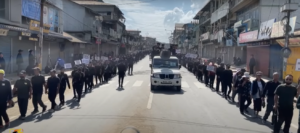Unau is your digital destination for celebrating the essence of brotherhood across the Kuki, Mizo, Zomi, and Hmar tribes.
New Delhi, September 24 – A committee appointed by the Supreme Court to investigate the ongoing violence in Manipur has urged the state government to take steps to publish a comprehensive list of individuals who have lost their lives in the turmoil. In addition, the committee advised the government to ensure the dignified disposal of bodies that remain unclaimed in the state’s morgues since the eruption of ethnic violence on May 3. This development comes as Manipur continues to grapple with the aftermath of the conflict, with ethnic tensions dividing communities and complicating the process of identifying and claiming bodies.
Unclaimed Bodies in Manipur Morgues
Recent reports from India Express highlight the committee’s recommendations to the N. Biren Singh-led government in Manipur. According to Manipur Police, 96 bodies remain unclaimed in the state’s morgues. These unclaimed bodies are a somber reminder of the violence that has gripped the region, with the official death toll standing at 175. However, the ability to claim these bodies is influenced by the complex ethnic dynamics of Manipur, where communities find it challenging to navigate areas controlled by others.
For instance, the report cited an example where 35 of the unclaimed bodies in a Churachandpur morgue belonged to members of the Kuki-Zomi community, which holds dominance in the area. However, the Indigenous Tribal Leaders’ Forum (ITLF) had directed families not to claim these bodies. This strategic move was aimed at pressuring the government to assist in transporting bodies from the Imphal area, which is under Meitei control.
Committee Led by Retired J&K High Court Chief Justice Gita Mittal
The committee, led by retired J&K high court Chief Justice Gita Mittal and comprising two other female judges, has called on the Manipur government to take decisive action. Their recommendations include the publication of a list of deceased individuals, with a concerted effort to identify the next of kin for these bodies. If, despite these efforts, bodies remain unclaimed, the committee has advised the government to ensure their respectful disposal in designated areas. These areas would be identified by district collectors, ensuring that the process aligns with the dignity and respect owed to the deceased.
Measures to Enhance Victim’s Compensation Scheme
In an affidavit submitted to the Supreme Court last week, Manipur Chief Secretary Vineet Joshi noted that measures had already been implemented to upgrade the state’s victim’s compensation scheme. It is within this affidavit that the recommendations of the committee were documented.
Ethnic Divisions Impacting the Claiming of Bodies
The ongoing ethnic tensions and divisions in Manipur have significantly complicated the process of identifying and claiming bodies. Communities find themselves caught in a web of ethnic politics, hindering their ability to traverse areas controlled by other groups. This dynamic has led to the accumulation of unclaimed bodies in morgues, prolonging the anguish and uncertainty experienced by families awaiting closure.
Commitment to Dignity and Respect
The recommendations put forth by the committee underscore the commitment to treating the deceased with dignity and respect. By advocating for the publication of a comprehensive list and the establishment of procedures for the dignified disposal of unclaimed bodies, the committee seeks to bring a semblance of closure to a community grappling with the aftermath of violence.
As Manipur navigates these complex challenges, the government’s response to the committee’s advice will play a critical role in ensuring that the rights and dignity of the deceased and their families are upheld. The road to reconciliation and healing in Manipur remains fraught with challenges, but these recommendations mark a step toward addressing the humanitarian aspect of the ongoing crisis.








